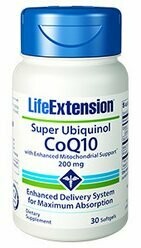Super Ubiquinol CoQ10 with Enhanced Mitochondrial Support™ 200mg
DESCRIPTION
- Super Ubiquinol CoQ10 with Enhanced Mitochondrial Support™
- 200 mg, 30 softgels
- Item Catalog Number: 01431
| Super Ubiquinol CoQ10 with Enhanced Mitochondrial Support™ is formulated with ubiquinol , a highly bioavailable form of coenzyme Q10 nutrient, and augmented with the adaptogen PrimaVie® shilajit, clinically shown to further increase CoQ10 absorption, promote cardiovascular health, and help restore youthful cellular energy. Benefits at a Glance:
CoQ10 for heart health and cellular energy CoQ10 (or coenzyme Q10) is an essential nutrient your body requires for healthy mitochondrial function, a process that produces body energy at the cellular level.1 Because of this, it makes sense that CoQ10 is concentrated in high-energy organs such as your brain,2 liver, kidneys, and (most importantly) your heart.3,4 CoQ10 also has powerful antioxidant properties, protecting important proteins5 and mitochondrial DNA6 from oxidative damage.1 Unfortunately, CoQ10 levels in your body deplete over time. Natural and unnatural causes of CoQ10 depletion As we age, CoQ10 levels in our body naturally decrease. What’s more, popular statin drugs which are used to lower cholesterol, can also deplete CoQ10 levels in the blood and potentially in tissue.7,8 And while statins have been shown to reduce plasma CoQ10 by nearly 40%,9 the normal aging process may be even worse: reducing CoQ10 levels in the heart muscle wall by as much as 72%.10 Improved bioavailability: ubiquinol and shilajit The traditional form of CoQ10, ubiquinone , is difficult for the body to absorb. But another form, ubiquinol, has been shown to absorb up to 8 times greater than ubiquinone. That’s why Life Extension offers a highly bioavailable form of ubiquinol CoQ10 in a patented delivery system with superior absorption levels.11 Shilajit enhances CoQ10 effectiveness PrimaVie® shilajit is an adaptogen shown to promote mitochondrial metabolism, helping mitochondria convert fats and sugars into ATP — the main source of cellular energy.12-17 When combined with ubiquinol CoQ10, it has been clinically shown to double levels of CoQ10 in the mitochondria.18 Shilajit prolongs CoQ10’s efficacy at the cellular level by stabilizing it in its ubiquinol form19,20 and facilitates greater cellular energy output by improving delivery of CoQ10 into the mitochondria.12-17 In middle-aged mice, ubiquinol was up to 40% more effective at slowing measurements of aging compared to ubiquinone.21 In another preliminary study in mice, the combination of CoQ10 and shilajit produced a 56% increase in cellular energy production in the brain — 40% better than CoQ10 alone. Muscle tissue saw a 144% increase, which was 27% better than with CoQ10 by itself.22 Breakthrough longevity and cellular energy formula Research supports the value of this unique combination of ubiquinol CoQ10 and shilajit. That’s why we’ve created Super Ubiquinol CoQ10 with Enhanced Mitochondrial Support™, to create a powerful synergy that supports heart health and youthful cellular energy production better than CoQ10 alone. For younger consumers or people with no known heart health issues, we recommend a daily CoQ10 supplement with at least 100 mg of ultra-absorbable ubiquinol CoQ10. For older customers or those with heart health concerns, we recommend 200 mg of ubiquinol CoQ10 per day. We also offer 50 mg CoQ10 supplements for those who wish to take a lower dose or who wish to spread their CoQ10 intake throughout the day. This supplement contains 200 mg of ubiquinol CoQ10 per softgel. |
| References
|
SUPPLEMENT FACTS
| Supplement Facts | ||||||||||||||||
Non-GMO Kaneka QH Ubiquinol® is a registered trademark of Kaneka Corporation. |
||||||||||||||||
| Dosage and Use | ||||||||||||||||
|
||||||||||||||||
| Warnings
To report a serious adverse event or obtain product information, contact 1-866-280-2852. |
||||||||||||||||
